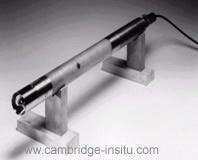|
 As
well as looking at how to clean up large areas of contaminated land, we
are investigating methods to assess the effectiveness of engineering solutions
applied to contaminated sites. The nature of the ground is very variable
(clays, sands, gravels mixed together) and this creates a large uncertainty
in assessing whether the solutions applied have been effective or not.
The ground is like a black box; unless you excavate the whole soil, you
will not be able to see what has happened. We are trying to develop innovative
methods that can be used to assess the current condition of a site without
removing the soil. As
well as looking at how to clean up large areas of contaminated land, we
are investigating methods to assess the effectiveness of engineering solutions
applied to contaminated sites. The nature of the ground is very variable
(clays, sands, gravels mixed together) and this creates a large uncertainty
in assessing whether the solutions applied have been effective or not.
The ground is like a black box; unless you excavate the whole soil, you
will not be able to see what has happened. We are trying to develop innovative
methods that can be used to assess the current condition of a site without
removing the soil.
We recently started research on innovative tracers, which can be injected
from one side of a contaminated site and then extracted from the other.
By examining the pattern of how the tracers move from one side to the
other, we are hoping to characterize how the contaminants are distributed
in the ground. The idea is to use these tracers before and after the clean-up
so that the efficiency of the clean-up method can be assessed.
We are also examining the effectiveness of physical barriers used to contain
contaminants in the ground. At the moment, there is uncertainty concerning
how long these containment systems will last. Hence, there is a need to
check their performance at regular intervals. In collaboration with Cambridge
Insitu, a local company specializing in field testing , we are developing
a tool capable of assessing the performance of containment systems in-situ.
The tool measures the permeability, strength and stiffness of containment
systems directly. This has many potential advantages compared with having
to remove parts of the barrier for testing in a laboratory.
|
|
|

E-mail
Home page
Tel 01223 332713;
Other environmentally related projects:
In-situ clean up of contaminated land
|
